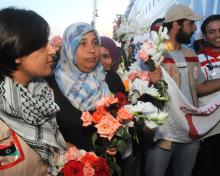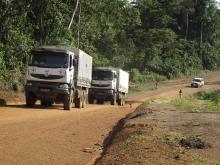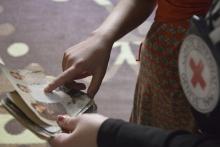Basic international humanitarian law (IHL) rules applicable to this situation:
Whenever possible, and particularly after an engagement, each party to the conflict must, without delay, take all possible measures to search for, collect and evacuate the dead without adverse distinction.
Parties to the conflict must endeavour to facilitate the return of the remains of the deceased upon request of the party to which they belong or upon the request of their next of kin.
The dead must be disposed of in a respectful manner and their graves respected and properly maintained.
To facilitate identification of the dead, each party to the conflict must record all available information prior to disposal and mark the location of the graves.
Each party to the conflict must take all feasible measures to account for persons reported missing in connection with armed conflict and must provide their family members with any information it has on their fate.
The case in brief
Between 1992 and 1995, the armed conflict in Bosnia and Herzegovina resulted in tens of thousands of people unaccounted for, leaving their relatives with no information about their whereabouts. Discrimination linked to the ethnic roots of the conflict impeded the search for the missing.
Since the late 1990s, the government of Bosnia and Herzegovina has taken unparalleled action to strengthen its capacity to address the issue of missing people. In cooperation with the International Commission on Missing Persons (ICMP) and the ICRC, among other organizations, and the families of the missing, it has put in place an institutional and legislative framework that has led to the identification of thousands of people missing in connection with the conflict.
IHL compliance highlights
- In 2014, with ICRC assistance, the government of Bosnia and Herzegovina enacted a Law on Missing Persons. In particular, this law:
- established the Missing Persons Institute (MPI), mandated to search for and identify missing people across the whole country, thereby addressing the discriminatory practice of searching for people based on ethnicity
- clearly defined:
- the rights of families to know the fate of their missing relatives
- the authorities’ obligation to account for all those missing by providing information and support to the MPI
- mandated the creation of a central database of missing persons to accelerate the tracing process.
- The MPI duly compiled a centralized database of missing persons in cooperation with the ICMP and other organizations, completed in 2011.
- In August 2019, the MPI published a further database containing the names of 27,085 missing persons whose cases had been verified.
Case prepared by Zuhra Aziz, James Pitman, and Luke Anderson, J.D students at Emory University School of Law, under the supervision of Professor Laurie Blank, Emory University School of Law.
A. BOSNIA AND HERZEGOVINA DEVELOPMENT OF INSTITUTIONAL CAPACITY TO ADDRESS THE ISSUE OF THE MISSING PERSONS
[Source: International Commission on Missing Persons, Bosnia and Herzegovina, available at https://www.icmp.int/where-we-work/europe/western-balkans/bosnia-and-herzegovina/] [1]
Since 1996, ICMP has played a central role in this effort, by helping to develop Bosnia and Herzegovina’s institutional capacity to address the issue of missing persons in a non-discriminatory manner, crafting legislation to safeguard the rights of families, introducing systematic forensic methods, including the use of DNA, upholding rule of law-based processes that have ensured the provision of evidence to domestic courts and the ICTY [International Criminal Tribunal for the Former Yugoslavia] , and facilitating the active engagement of the families of the missing.
Bosnia and Herzegovina’s progress on this issue should be seen in the context of a developed policy framework incorporating international standards of technical and administrative capacity. The result has been an institutional, legislative and cooperative process, underpinned by the establishment of the Missing Persons Institute of Bosnia and Herzegovina (MPI), the establishment of the Central Records, the adoption of a Law on Missing Persons and the creation of inter-institutional cooperation mechanisms to address the issue of unidentified human remains in the country’s mortuaries under the overall auspices of domestic courts and prosecutors.
[…]
The BIH [Bosnia and Herzegovina] Law on Missing Persons, enacted in 2004, was the first such piece of legislation in a post-conflict country related to missing persons anywhere in the world. It codifies the “right to the truth regarding the fate of missing relatives,” as well as a right to be informed about investigation efforts. It also established the Missing Persons Institute (MPI) of BIH as an institution of the State and with a mandate to search for and identify missing persons across the entire territory of BIH, thereby ending the discriminatory practice of searching for missing persons based on their ethnic affiliation. It mandated the creation of both the Central Records on Missing Persons (CEN) and a Fund for the Families of the Missing. It also made provision for sanctions against individuals and institutions that withhold information pertaining to the fate of missing persons.
[…]
The unified CEN database was completed in February 2011. It combined 12 separate databases with information on missing persons collected by the former Federation Commission on Missing Persons, the RS Office for Tracing Missing and Detained Persons and the State Commission on Tracing Missing Persons, as well as data from ICRC and ICMP.
The completion of the CEN is of regional significance. In 2011, at the request of the governments of Bosnia and Herzegovina, Serbia, Croatia, Montenegro, and Kosovo, ICMP initiated the compilation of a unified regional list of persons missing in the Western Balkans. This list seeks to arrive at a definitive number of persons missing in these countries. It will also help to clarify jurisdictional issues related to the search for persons reported missing in more than one country. In addition to its immediate practical benefits, the list represents a historical record.
[…]
[1] See also here https://www.icrc.org/en/doc/resources/documents/feature/2013/09-28-bosnia-herzegovina-disappeared-missing.htm.
B. BOSNIA AND HERZEGOVINA: FAMILIES OF MISSING PERSONS PURSUE THEIR QUEST
[Source: ICRC, Bosnia and Herzegovina: Families of Missing Persons Pursue Their Quest, August 28, 2013, available at https://web.archive.org/web/20230829173238/https://www.icrc.org/en/doc/resources/documents/feature/2013/09-28-bosnia-herzegovina-disappeared-missing.htm on Google Chrome or Firefox]
[...]
The ICRC has been involved from the very beginning. We managed to include an article in the peace agreement, obliging the former warring parties to help determine the fate of those who went missing during the 1992-95 conflict. The ICRC helped the families organize their associations and advocated for the families’ right to know what happened to their relatives. We also established a forum in which the former parties to the conflict could exchange information on missing persons.
The ICRC provided support to another institution, the International Commission on Missing Persons, leading in turn to the establishment of the Missing Persons Institute (MPI). We also participated in the creation of the Bosnia-Herzegovina law on missing persons, which clearly defined the status and rights of the families of missing persons and the obligation of the authorities to account for all missing persons by providing information and support to the MPI.
The MPI recognized the importance of the families, by creating an advisory board of six representatives of the country’s 52 associations of the families of missing persons. This board, with broad ethnic and regional representation, personifies the voice of the families and channels communication between the families and the MPI. The ICRC continues to support the advisory board.
[…]
The work being done in Bosnia-Herzegovina on the missing persons issue is unparalleled, ranging from the legal definition of the issue to exhumations of mass and individual graves and the identification of remains. Families have submitted tracing requests to the ICRC concerning 22,438 people. In total, 14,552 of these families have received information on their relatives. However, there are still 7,886 families looking for information. Exhumations are an important way of helping the families find peace of mind. However, in the last year the pace of exhumations has slowed significantly. Over the last twelve months, only 650 sets of remains were identified, compared with up to 2,000 a year a few years ago. The ICRC and its partners are trying to ensure continued political will to provide new information on the location of graves.
A new Central Records of Missing People has been established to accelerate the tracing process. Many see such records as the ultimate proof of a life once lived, a memorial to those who died and whose remains have yet to be found.
C. SUPPORT TO BOSNIA AND HERZEGOVINA IN THE SEARCH OF MISSING PERSONS
[Source: ‘Bosnia : the search for missing persons’, JusticeInfo.Net, 28 May 2015, available at https://www.justiceinfo.net/en/reconciliation/316-bosnia-the-search-for-missing-persons.html]
[…]
The United Nations, NATO [North Atlantic Treaty Organization], OSCE [Organization for Security and Co-operation in Europe], the European Union and global and regional charities have directed most of their attention to BiH, investing significant resources in its post-war recovery. According to the IMF [International Monetary Fund], BiH alone has received more per capita in foreign aid than any European state after the Second World War. Only between 1996-1999, US $3.7 billion were sent to the country. […]
D. BOSNIA PUBLISHES DATABASE OF 27,000 WARTIME MISSING PERSONS
[Source: Bosnia Publishes Database of 27,000 Wartime Missing Persons, by Albina Sorguc, August 29, 2019, available at https://balkaninsight.com/2019/08/29/bosnia-publishes-database-of-27000…]
The database of around 27,000 verified names of people who went missing in the 1992-95 war is being published to coincide with the International Day of the Disappeared.
The Missing Persons Institute of Bosnia and Herzegovina on Thursday announced the publication of the new database containing the names of all the missing persons that have been verified so far.
“Up to now 27,085 missing persons reports have been verified”, Marko Jurisic, a member of the Missing Persons Institute’s board of directors, told a conference in Sarajevo.
“Around 25,500 mortal remains have been excavated, while the search for 7,206 more missing persons still continues in Bosnia and Herzegovina,” Jurisic added.
He also pointed out that this year, a regional database of missing persons was created, containing the names of 11,765 people from Bosnia and Herzegovina, Croatia, Kosovo, Montenegro and Serbia.
“The database is active. It is updated on a daily basis and it should serve as a tool for resolving the fate of the missing persons in the region,” he said.
[…]
Discussion
I. Classification of the Conflict and Applicable Law
1. How would you classify the conflict in Bosnia and Herzegovina between 1991-1995? Was there an armed conflict? Who were the parties to the conflict? What additional information would you require to make this determination? (GCI-IV, Art.2, Art. 3; P I, Art. 1; PII, Art. 1)
II. Identification of Missing Persons
2. What are the IHL responsibilities of parties to a conflict with regard to missing persons? (GC I, PI, Art. 33; GC IV, Art.26; CIHL Rule 117)
3. What rights do the families of the missing have under IHL? Do they have a right to know the fate of their loved ones? (PI, Art. 32; CIHL, Rule 117)
4. How shall the remains of the deceased be disposed of? To whom does it have to return the remains? Are the relevant rules also applicable in non-international armed conflicts? (GC I, Arts 15, 16, 17; GC III, Art. 120; GC IV, Arts 16, 129, 130; PI, Art. 34; PII, Art. 8; CIHL, Rules 112, 113, 114, 115, 116)
III. Elements Contributing to Respect For IHL
5. (Documents A) How important was the role of the ICMP to support the building of Bosnia’s institutional capacity and ability to set up a program to identify missing persons?
6. (Document B) How did Bosnian citizens influence the efforts to find and identify the missing? How has the ICRC helped citizens reinforce their rights to information on missing persons?
7. (Documents B and C) In your opinion, would the identification of missing persons contribute to the reconciliation process in the region? If yes, could it have been a reason behind the behavior of respect of Bosnia and Herzegovina?
8. (Document C) What could have been the influence of the investment of resources by the United Nations, NATO, OSCE, the European Union and other organizations in the respect for the IHL obligations of Bosnia and Herzegovina including the identification of missing persons?






